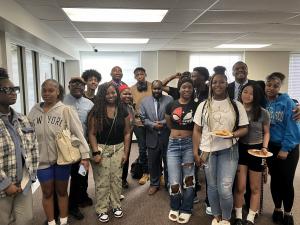


In addition to the growing emphasis on financial literacy education nationwide, Langston University School of Business in Oklahoma is taking steps to address the critical need for financial literacy in the state's African American communities. The school aims to equip young people, particularly in the Black community, with the knowledge and skills to manage their finances effectively [9cf98834].
Oklahoma has already mandated financial literacy education for students in grades 7-12, recognizing the importance of teaching young people about budgeting, saving, investing, and managing debt. To enhance its financial literacy education efforts, Langston University School of Business is introducing a new minor in finance literacy and a dedicated course on financial literacy. The school's professors, including Dr. Michael Hamilton, Dr. Hassan Ahmed, Dr. Charles Mambula, and Dr. Shah Chowdhury, are available for interviews and speaking engagements to discuss the importance of financial education [9cf98834].
The initiative at Langston University School of Business is specifically targeted toward parents, grandparents, and community leaders. By providing education and resources to these individuals, the school aims to significantly impact Oklahoma's African American communities and prepare students for a financially stable future [9cf98834].
Financial literacy is not only important in Oklahoma but also across the country. Entrepreneur and Operation Hope founder John Hope Bryant highlights the significance of financial literacy as the civil rights issue of this generation. Bryant emphasizes that financial literacy is a fundamental right that should be accessible to all individuals. He argues that financial literacy is the least expensive and most effective tool for community economic development, leading to increased participation in the economy and improved financial security. Bryant also emphasizes the importance of accessible funding for Black and brown entrepreneurs, financial wellbeing benefits in the workplace, and conversations about the private sector's role in communities to achieve financial equality. By raising credit scores and providing financial education, communities can experience profound transformations in terms of life expectancy, education levels, homeownership rates, and crime rates [6581a3c7].
Ohio is also taking steps to address the financial strain faced by families impacted by addiction. Ohio's Department of Commerce has launched a program called 'Recovery Within Reach,' which trains financial advisers to assist these families. The program equips advisers with the knowledge to identify signs of addiction in their clients' families and connect them with resources to alleviate the financial burden. This initiative aims to combat the stigma surrounding addiction and encourage individuals to seek treatment. Financial advisers are taught to look for indicators such as unexpected withdrawals, late payments, accidents or injuries, skyrocketing insurance rates, or sudden custody of a minor family member. Ohio's program also provides an information hub on its website to help individuals find affordable treatment options [e556de15].
The opioid crisis has had a significant economic impact, costing the US economy $631 billion from 2015 to 2018, with the majority of the costs falling on individuals and the private sector. Family members affected by addiction often face substantial financial burdens, including medical bills, treatment costs, property damage, and missed work. Ohio's 'Recovery Within Reach' program aims to equip financial professionals with the tools to support these families and prevent financial ruin [e556de15].